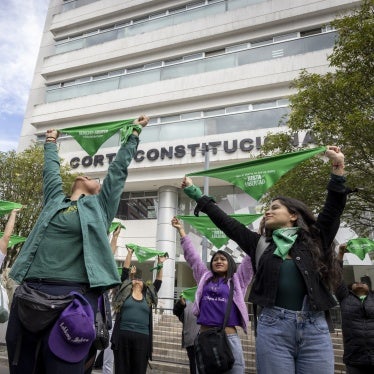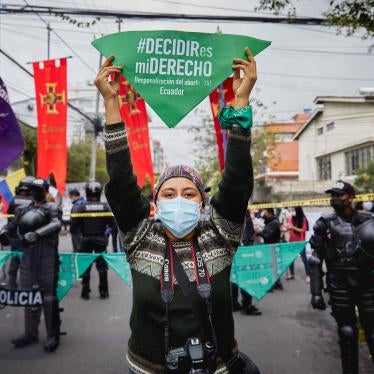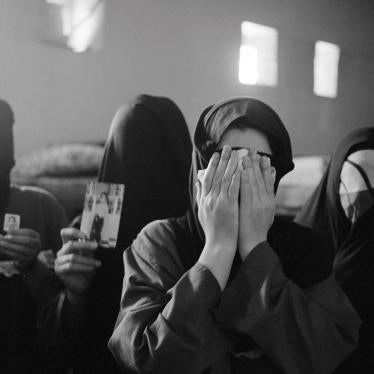(Guatemala City, February 12, 2002) Women in Guatemala's largest female-dominated labor sectors face persistent sex discrimination and abuse, Human Rights Watch charged in a report released today.
The 147-page report examines two sectors, export processing and private households, which employ tens of thousands of women sewing clothes for sale in the United States and working as live-in domestic workers.
The report, From the Household to the Factory: Sex Discrimination in the Guatemalan Labor Force, also finds that some U.S.-based clothing retailers contract with Guatemalan "maquilas," or export-processing factories, that discriminate against women who are pregnant.
The Guatemalan labor code protects women workers from this type of discrimination, but is rarely enforced in the maquila sector. Meanwhile, women and girls working in private households do not have adequate legal protection, and are frequently subject to sexual assault and other abuses by their employers.
"Women workers are getting a very raw deal in Guatemala," said LaShawn R. Jefferson, executive director of the Women's Rights Division of Human Rights Watch. "The country's labor law has some major gaps, and in many cases it's not being enforced anyway. The Guatemalan government has got to do a better job protecting women workers."
Domestic workers, many of whom come from Guatemala's historically oppressed indigenous communities, do not have the legal right to be paid the minimum wage. They also have no right to an eight-hour work day or a forty-eight hour work week, have only limited rights to national holidays and weekly rest, and by and large are denied the right to employee-paid health care under the national social security system.
Many domestic workers begin working as young adolescents. Guatemalan labor laws do not provide adequate protection for domestic workers who are under the age of eighteen. International law requires Guatemala to protect children from the most serious forms of child labor, including work for long hours and employment that puts them at risk of sexual abuse.
With the expansion of the export-processing sector in Guatemala, thousands of women who might otherwise become domestic workers are now seeking jobs in the "maquilas," apparel manufacturing factories. An estimated 80 percent of the 80,000 maquila workers in Guatemala are women.
In order to get a job in a factory, women must often reveal whether they are pregnant, either through questions on job applications, in interviews, or through physical examinations. Workers who become pregnant after being hired are often denied the full range of maternity benefits provided for in Guatemalan law. And the maquilas routinely obstruct workers' access to the employee health care system to which they have a right - with a direct impact on working women's reproductive health.
"The maquilas offer much-needed jobs to thousands of women," said Jefferson. "But the price of a job should never be working women's rights to equality."
The U.S.-based clothing manufacturers and retailers that have contracts with discriminatory maquilas include Target, The Limited, Wal-Mart, GEAR for Sports, Liz Claiborne and Lee Jeans. All of these have codes of conduct or terms of engagement that prohibit discrimination. GEAR for Sports and Lee Jeans specifically prohibit pregnancy testing.
In an era of increased globalization, corporations have a critical role to play in promoting and protecting universally recognized human rights generally, and labor rights in particular, Human Rights Watch said. "We need to globalize rights, not discrimination," said Jefferson.







